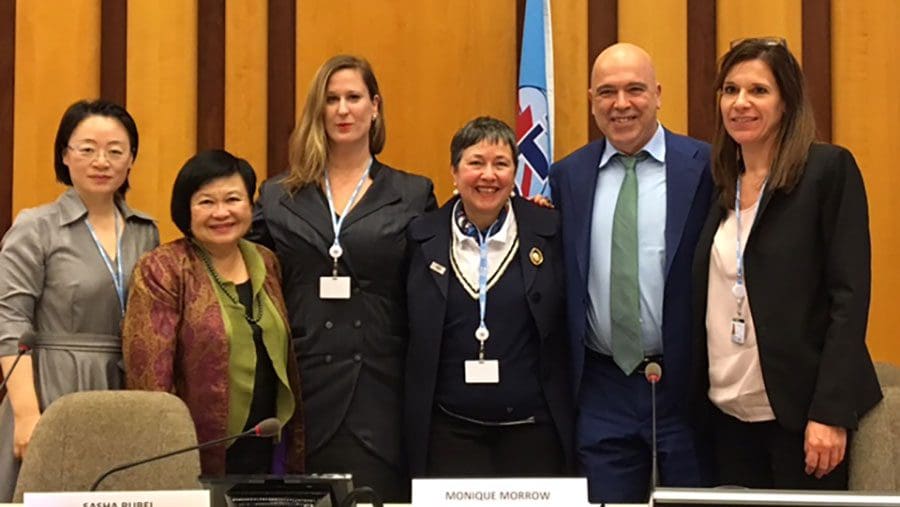IEEE SA participated in the World Summit on the Information Society (WSIS) Forum, 8-12 April in Geneva. Held annually, the WSIS Forum brings the Information and Communications Technologies (ICT) community that focuses on making the information society accessible to all.
This year, more than 3000 ICT experts and implementation actors contributed to and participated in the WSIS Forum to foster partnerships, showcase innovation, exchange best practices and announce new tools and initiatives to use ICTs to advance the United Nations’ Sustainable Development Goals (SDGs).
At the WSIS Forum 2019, Konstantinos Karachalios, IEEE SA Managing Director, made two interventions at the High-Level Policy Segment. These were at the High Level Strategic Dialogue: Multistakeholder Partnership for WSIS Implementation and the High Level Session on Ethical Dimensions of Information and Knowledge Societies.
IEEE SA hosted a Thematic workshop on Autonomous and Intelligent Systems in the Digital World: Moving from Principles to Practice. Set in the context of the Ethically Aligned Design, First Edition: A Vision for Prioritizing Human Well-being with Autonomous and Intelligent Systems, this workshop addressed how to move AI frameworks and principles into practical application. The panel of Mei Lin Fung, People Centered Internet, Konstantinos Karachalios, IEEE, Karine Perset, OECD, Sasha Rubel, UNESCO, and Victoria Wang, IEEE, and moderated by Monique Morrow of The VERTRI Foundation, focused on recommendations in values and intentions in ICT design, as well as implementations across sectors, industries and stakeholder communities. Outcomes of the session included:
- Human rights should be incorporated from the inception stage of the development of autonomous and intelligent systems
- Governments and regulators should take an enhanced role in protecting end users of these emerging technologies
- There is a need to do more to protect children who are exposed to technology
- Digital literacy, particularly in youths and those in developing countries, is vital to ensuring equitable distribution and use of these technologies
- Regarding inclusiveness, the technologies are going to improve overall inclusiveness or deteriorate it
Delegation members, including Konstantinos Karachalios, Mei Lin Fung and Monique Morrow, participated in the High Level Dialogue: The Ethical Dimensions of Artificial Intelligence, hosted by UNESCO. This high-level dialogue took stock of ongoing discussions and existing initiatives and studies on the ethical dimensions of Artificial Intelligence and made recommendations so that Artificial Intelligence can contribute towards fundamental values that leave no one behind. Outcomes of the session discussion included:
- Considering the ethical dimensions of AI is essential as ethical dimensions have a reach beyond legislative frameworks, and are deeply connected to democratic processes
- In the development of an ethical AI, a commitment to human agency must be privilege
- Collaborative and inclusive approaches to AI must be ensured in order to develop, through multi-stakeholder consultation, guiding principles for an ethical AI
- The development of principles, policies, and standards for an ethical AI must be rooted in existing work in this domain, notably by the IEEE, European Commission, Council of Europe, OECD, and UNESCO
Konstantinos Karachalios also participated in the session Growing Global Challenges of Internet Addiction: Impact to the Youth and a Nation, hosted by the e World Wide Group. This session addressed the global challenge of internet and digital addiction and the consequences. Panelists discussed the signs, symptoms, consequences and actions that need to be taken to harness and address the growing challenges of internet addiction and exposure to the young vulnerable minds
To round out our programming the WSIS Forum, IEEE SA hosted an IEEE @ the World Summit on the Information Society Forum breakfast session on Autonomous and Intelligent Systems for Sustainable Development Goals. The informal session shared the accomplishments of the IEEE Global Initiative, and other key global efforts addressing AI and A/IS issues, and guests shared with each other their efforts in this space.
To learn more about the WSIS Forum 2019 and its outcomes, please read the WSIS Forum Outcome document and the WSIS Forum High Level Track Outcomes Document.









